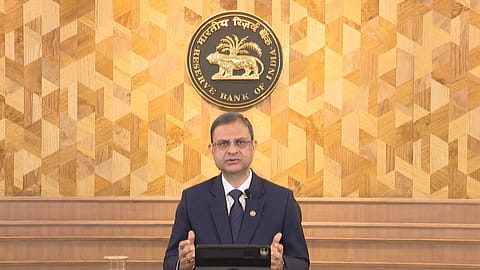Growth momentum to continue on strong macro fundamentals, robust demand: RBI
The RBI in its monthly bulletin says inflation has dropped to 3.6% in February 2025, aided by food price corrections, but risks from commodity price volatility and global trade uncertainties persist

The Reserve Bank of India’s (RBI) monthly bulletin, released today, says that domestically, macroeconomic fundamentals remain strong, and economic growth is poised to sustain momentum. This is driven by robust domestic demand, steady investment activity, ongoing policy-driven infrastructure development, and a pick-up in government spending.
The latest high-frequency indicators suggest aggregate demand continued will remain resilient in Q4:2024-25, says the report, adding that activity indicators such as E-way bills and toll collections recorded double-digit (y-o-y) growth in February 2025.
The RBI says the headline inflation in India has significantly declined from over 6% in October 2024 to 3.6% in February 2025. "India’s macroeconomic strength to face global challenges is bolstered by a decline in headline CPI inflation on account of a further correction in food prices."
Despite low inflation, volatility in commodity prices and weather anomalies remain potential risks. "Robust kharif production, better rabi sowing coupled with higher reservoir levels and seasonal winter correction in vegetable prices augur well for food inflation, although volatility in commodity prices and weather anomalies remain potential upside risks to the overall inflation outlook," says the RBI.
It adds that India’s external sector continues to find support from resilient services exports, which remain less affected by global disruptions while facing challenges from weakening global trade and tariff uncertainty. Going forward, the RBI expects India’s structural strengths — sound fiscal policies, a well-calibrated monetary framework, and digital transformation initiatives — could provide a strong foundation for long-term sustainable economic growth.
Globally, the central bank says the resilience of the global economy is being tested by escalating trade tensions and a heightened wave of uncertainty around the scope, timing, and intensity of tariffs. "While engendering heightened volatility in global financial markets, these have also caused apprehensions about the slowdown in global growth."
Despite these challenges, the Indian economy continues to demonstrate resilience as evident in the robust performance of the agriculture sector and improving consumption. "The reverberations of a tumultuous external environment, however, are being reflected in sustained foreign portfolio outflows."
Recommended Stories
The RBI says the immediate course of the global economy is likely to be shaped by escalating trade tensions, inflationary pressures stemming from tariffs, and attendant financial market volatility. "Recently announced fiscal stimulus is expected to provide a short-term boost to growth in the euro area, although sharp spikes in yields witnessed after such announcements indicate that resulting increases in long-term borrowing costs are likely to constrain very large expansions."
Commodity prices, says the RBI, have a "benign outlook" as a baseline case in line with the expected moderation in demand in an environment of growth slowdown. "The pass-through of higher tariffs to consumer prices, however, remains a key risk to inflation, which is already exhibiting signs of stubbornness in many AEs."
The RBI believes the central banks in advanced economies (AEs) would have to factor in such pressures while calibrating policy responses in an environment of a potential slowdown in growth. "EMEs, on the other hand, are likely to record higher growth than their AE counterparts, although capital outflows and potential currency depreciation remain major risks."